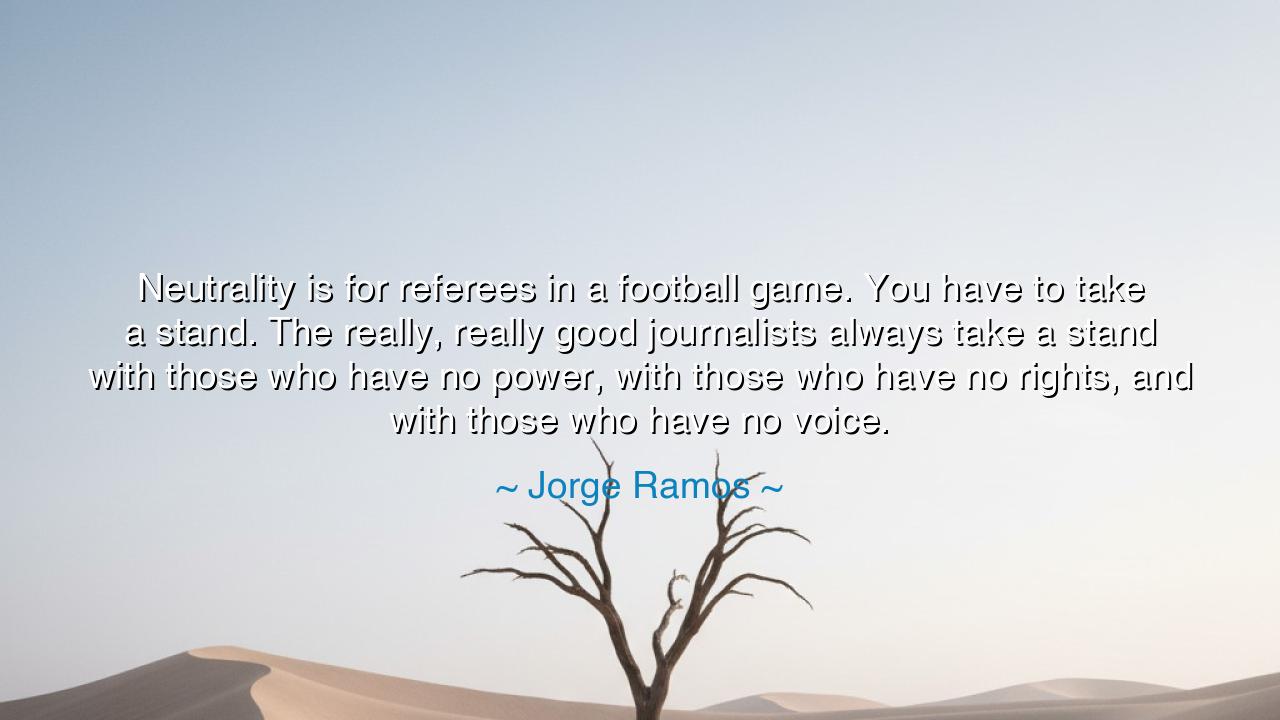
Neutrality is for referees in a football game. You have to take
Neutrality is for referees in a football game. You have to take a stand. The really, really good journalists always take a stand with those who have no power, with those who have no rights, and with those who have no voice.






In the words of Jorge Ramos—“Neutrality is for referees in a football game. You have to take a stand. The really, really good journalists always take a stand with those who have no power, with those who have no rights, and with those who have no voice.”—there resounds a call to courage. He proclaims that true journalism is not the cold balancing of scales, but the act of siding with justice. To remain “neutral” when injustice reigns is not fairness, but complicity. The duty of the truth-teller is to lift up the powerless, the oppressed, the silenced.
The ancients knew that silence in the face of injustice was itself a form of betrayal. Thucydides, in writing of the Peloponnesian War, did not pretend neutrality when recounting the slaughter of Melos. He exposed the cruelty of power that demands submission, and by doing so, gave voice to the crushed. In this, Ramos’s words echo the historian’s: the chronicler’s role is not to protect the strong, but to make visible the suffering of the weak.
Neutrality, as Ramos warns, belongs to games, not to life-and-death struggles. The referee may remain detached in sport, for no soul is broken and no life is lost on the field. But when nations oppress, when voices are silenced, when rights are denied, the observer must choose. To say nothing is to strengthen the oppressor. The prophet Amos thundered the same in ancient Israel: “Let justice roll down like waters.” His voice was not neutral—it was the voice of fire against corruption.
Consider too the example of Ida B. Wells, who in the 19th century documented the horrors of lynching in America. She could have remained “neutral,” reporting facts without passion, but instead she took her stand with the voiceless dead and the terrified living. Her journalism was not detached but courageous, and in her refusal to remain silent she gave strength to generations. She lived Ramos’s truth centuries before he spoke it.
Thus, let us carry this wisdom forward: neutrality in the face of injustice is surrender. The journalist, like the poet, the prophet, and the historian, must choose to stand with the vulnerable, for only then does truth have weight. To side with the voiceless is not bias—it is the highest form of justice, the eternal duty of those entrusted with words. For in lifting the powerless, one lifts humanity itself.






DDQuoc Dai Dang
I love this idea that great journalists stand with those who are powerless. It's easy to be neutral when you're reporting on events that don’t affect you personally, but the real challenge is highlighting the struggles of those who have been silenced. But, at the same time, can journalists be too focused on advocacy and lose their objectivity? Should they always make their stance clear, or is there room for more subtlety in some cases?
KTPhi Kim Trang
Jorge Ramos’ words resonate deeply in today's media landscape. It's true that a neutral stance can often be a way to avoid taking responsibility for the power dynamics at play. Journalism should be a tool for justice, not just information. But does it also risk turning journalism into activism? How do we balance a journalist's role as an advocate for the powerless while maintaining trust with all audiences?
NNDoan Phuong Nhi Nguyen
This quote really made me think. Journalism is more than just presenting both sides of a story. Taking a stand means standing up for what’s right and amplifying the voices of those who often go unheard. While neutrality may seem like a safe position, it can sometimes mean ignoring the deeper, underlying issues. Do you think there’s a risk that journalists who take a stand might be criticized for bias, or do we need more of that kind of courage?
KNNguyen Kieu Nhi
I completely agree with this perspective. Neutrality in journalism often feels like a cop-out, especially when there are clear issues of injustice or inequality. Journalists have a responsibility to speak up for those who are marginalized or oppressed. It's not just about reporting the facts but also about advocating for change. Do you think the media today does enough to support those without a voice, or has it become more about objectivity at the expense of advocacy?